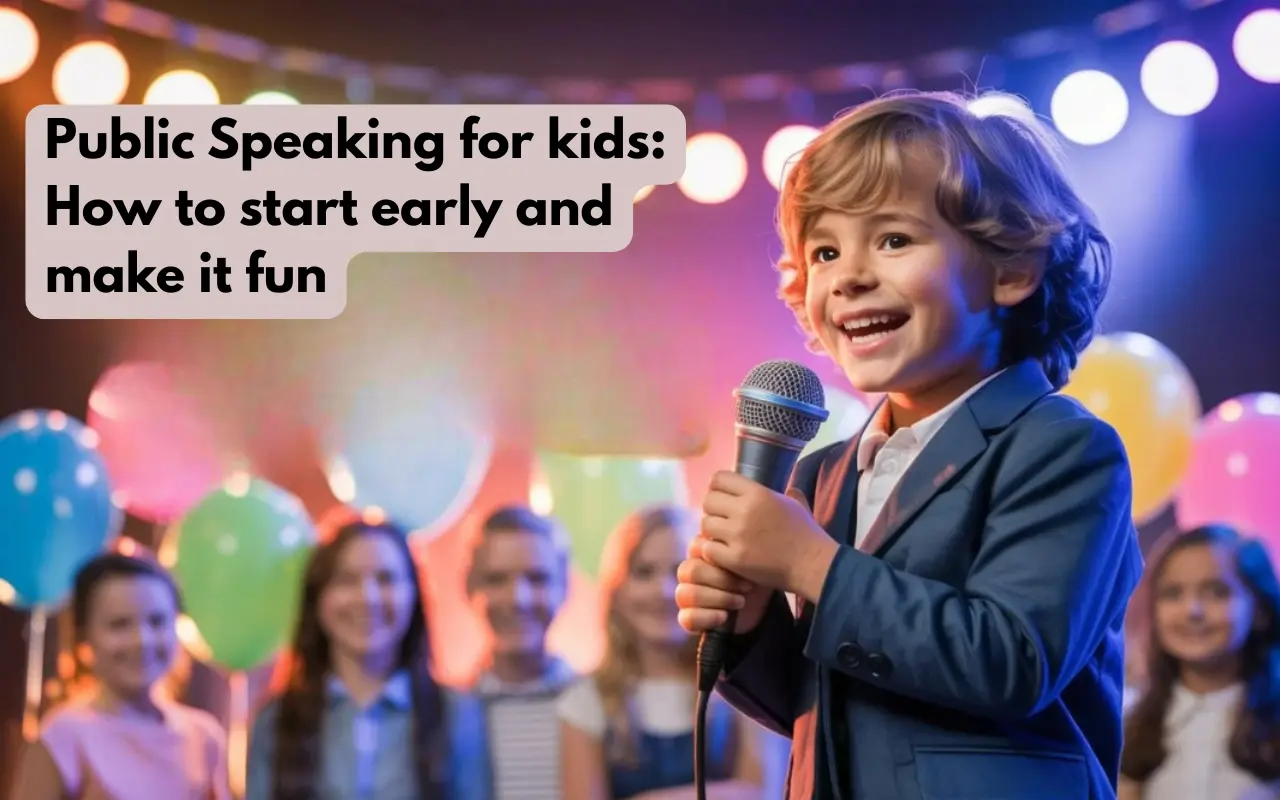Public Speaking for Kids: How to Start Early and Make It Fun




Public speaking might sound like something only adults do, but in reality, public speaking for kids is just as important, maybe even more so. Whether it's answering questions in class, telling a story to friends, or giving a short speech in school, these moments help build confidence and communication skills. The earlier we start, the better.
Parents often ask, “How can I help my child overcome stage fear?” or “What’s the right age for them to join public speaking classes for kids?” The answer is, it’s never too early.
This blog will guide you with simple tips, easy steps, and friendly techniques to help your child become a confident speaker.
Let’s start building those lifelong skills now.
.webp)
Children with strong speaking skills tend to do better not just in school but also in everyday situations: interviews, leadership roles, or even solving problems with peers.
Why starting early helps:
Benefits of Early Public Speaking | Description |
| Improves Confidence | Helps children speak up without fear. |
| Improves Communication | Teaches how to share thoughts clearly. |
| Encourages Leadership | Prepares them to take initiative. |
| Strengthens Academics | Enhances performance in class presentations and debates. |
| Builds Emotional Intelligence | Encourages empathy and understanding by expressing feelings. |
It’s best to begin as early as 4–5 years old with simple storytelling or show-and-tell activities. Here’s a breakdown:
Age Group | Suitable Activities |
| 4–6 Years | Show-and-tell, poems, nursery rhymes |
| 7–9 Years | Short speeches, storytelling competitions |
| 10–12 Years | Group discussions, class presentations |
| 13+ Years | Debates, extempore speaking, event hosting |
The younger they start, the more naturally they’ll develop public speaking skills for students.
Some simple public speaking tips for kids that parents can follow at home:
If you want to know about some effective techniques for fluency in public speaking, check out the blog given below,
Activity Type | Example |
| Storytelling Games | Tell a story using random objects. |
| Drama and Role-Play | Pretend to be a teacher, doctor, or superhero. |
| Tongue Twisters | Helps with pronunciation and makes practice exciting. |
| Speaking Challenges | Talk for 1 minute about a surprise topic. |
| Mirror Practice | Build confidence by watching themselves speak. |
Turn public speaking into playtime. The goal is to build comfort, not perfection.
A good class will cover:
Look for programs that balance structure with fun. That way, your child won’t just learn, they’ll enjoy the journey.
Every child feels nervous. That’s normal! Here’s how to help:
Fear | How to Overcome |
| Stage Fear | Begin with small audiences like family. Gradually increase. |
| Forgetting Lines | Teach them to remember ideas, not word-for-word. |
| Shyness | Start with one-on-one speaking at home. |
| Fear of Judgment | Celebrate their effort, not the result. |
For school-going students, public speaking opens doors in competitions, student councils, and even academics.
Key skills to build:
These skills don’t just help with speeches—they help in life.
In today’s fast-moving world, confident communication is a superpower. The earlier a child starts learning to speak confidently, the easier it becomes.
Whether your child is shy, unsure, or simply needs a little improvement, Join Interval’s Public speaking course online and you will learn,
● Techniques to craft and deliver compelling speeches
● Hands-on experience through real-world speaking exercise
● Strategies to engage and connect with your audience
● Tips to overcome stage fear and nervousness
● Practical methods to improve your speaking style
Enroll now in Interval Learning’s online Public Speaking Course and also explore our other non-academic courses online!
Children as young as 4–5 years old can start with basic activities like storytelling or show-and-tell.
Teach them to focus on ideas, not memorizing lines. Encourage pausing and starting again calmly.
Absolutely! It improves clarity of thought, class participation, and overall confidence.
Use games like role-play, storytelling, and mirror speaking. Keep it fun and pressure-free.
Our focus is on child-friendly, practical learning—no rote speeches, no pressure. Each child is nurtured individually, and we keep sessions fun, interactive, and full of real-world practice.
Currently, we offer online classes so your child can learn safely and comfortably from home. All sessions are live, interactive, and conducted in small groups for better attention.
Courses typically run for 4 weeks depending on your preferred schedule. We also offer weekend options to make it convenient for families.